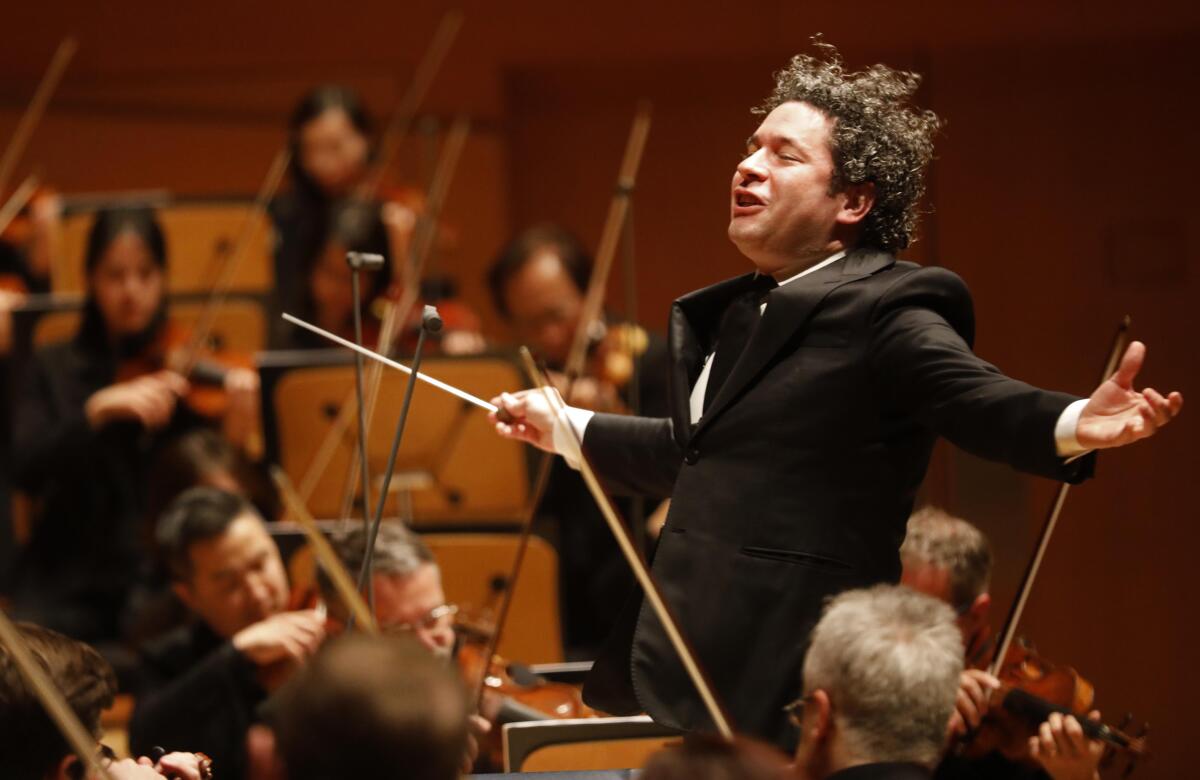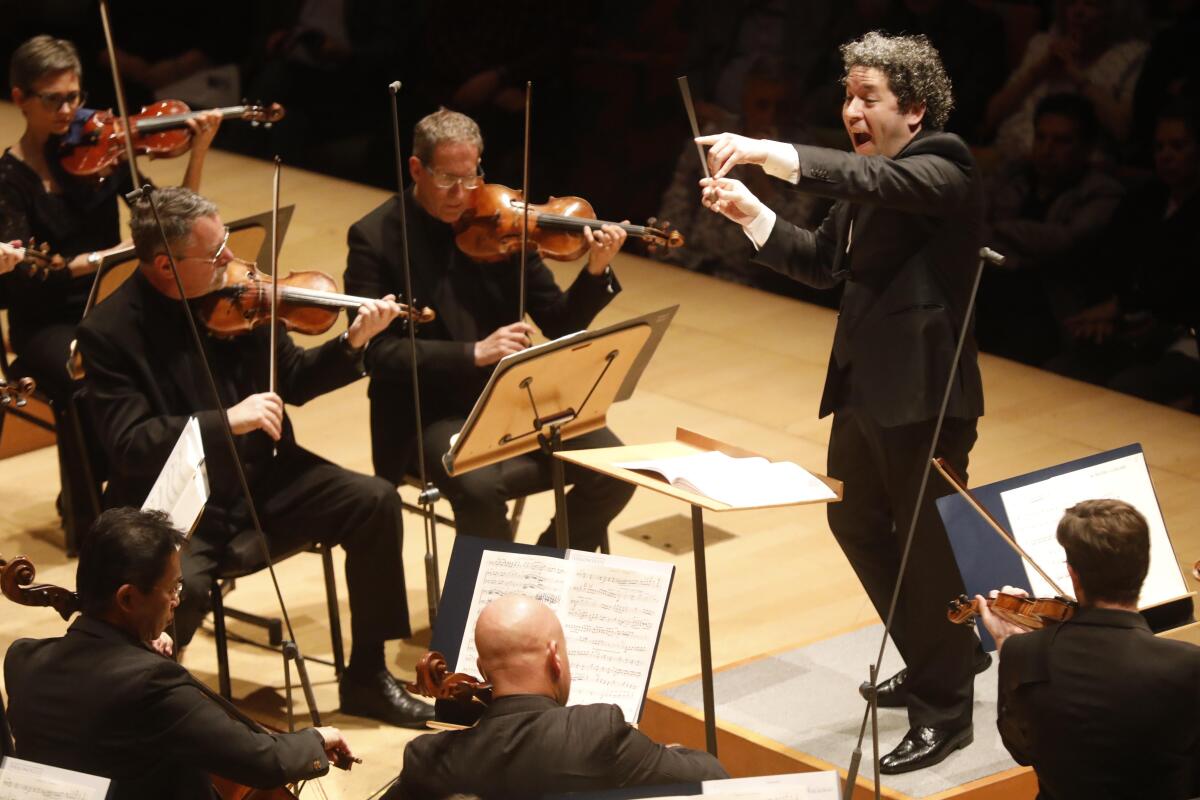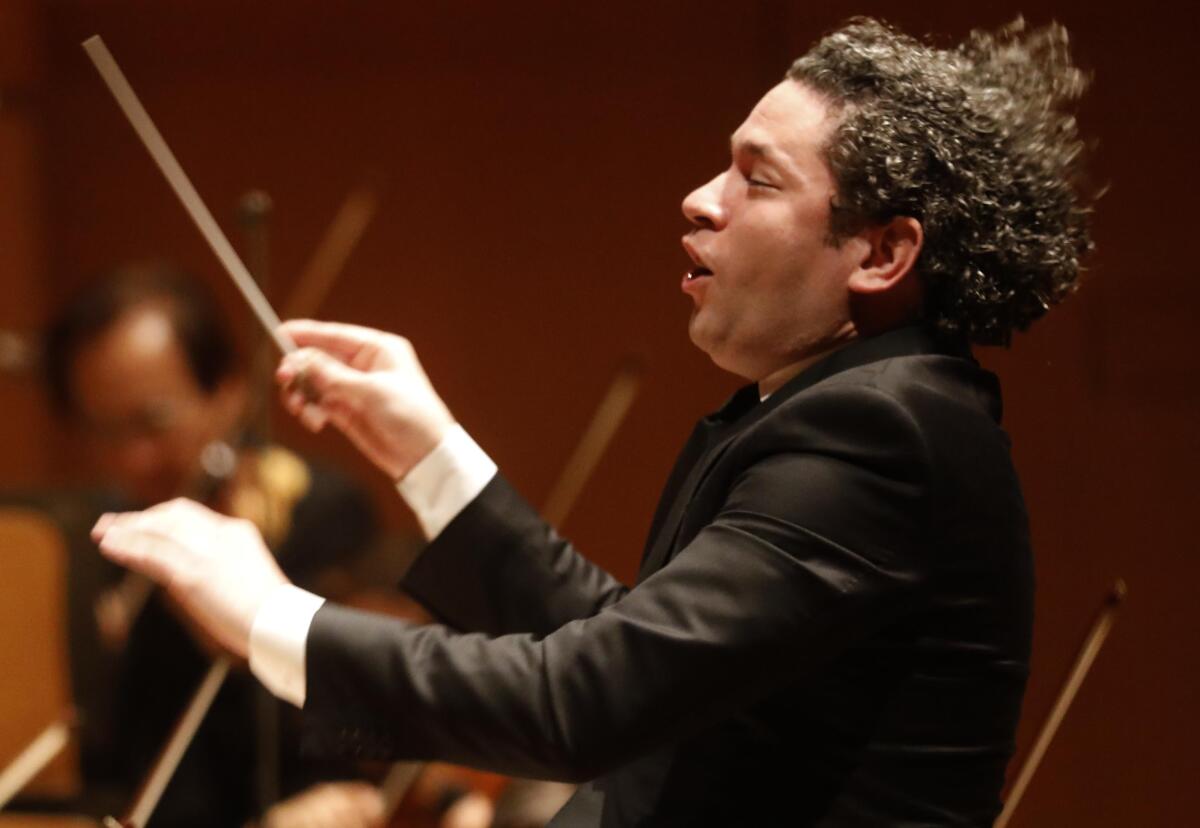Review: L.A. Phil’s Ives-Dvorák cycle seemed like a bad idea. Dudamel made it a revelation

Two years ago, when Gustavo Dudamel brought the Vienna Philharmonic to Mexico City, he included Ives’ Second Symphony on one of his programs. The most beautiful American symphony, as some have called it, was more beautifully played than I’d ever heard it thanks to the high fat content of the creamy Viennese strings, those ever-so-liquid winds and the burnished glory of the brass.
At a reception afterward I spoke with a couple of players who were enthralled with the score. They, of course, knew the name Charles Ives, that he was the father of American music and a quirky revolutionary. They had heard a few of his pieces on recording but never played anything. “He’s the American Dvorák,” one said in delighted discovery. And that’s just what the Second Symphony sounded like, which is to say, it sounded all wrong.
Ives’ accomplishment was to demolish the Dvorák model. The Czech composer encouraged Americans to use African American spirituals and Native American melodies as the themes of European-style symphonies. Ives, instead, produced extraordinary potboilers. His vast, messy soundscapes created a whole new template for an all-American art, a sort of acoustic combine half a century before Robert Rauschenberg.
Last weekend, Dudamel began what sounded like a bad idea for his annual symphony cycle: Ives’ four symphonies paired with Dvorak’s last three.
(A program of Ives and Dvorák string quartets will follow on the L.A. Phil chamber music series.) It appeared for all the world that Dudamel had bought into the dubious American Dvorák notion big time.

Instead, the first two programs — I heard Ives’ First and Dvorák’s Seventh on Thursday, then Ives’ Second and Dvorák’s Eighth on Sunday — proved a revelation. If Vienna’s Ives was gorgeously all wrong, the L.A. Second exceeded even the American gold standard set by Leonard Bernstein, who premiered the symphony in 1951 and was, until the end of his life, its most insightful exponent. Thursday’s performance went Bernstein one better. It was, in its every gesture, vibrantly, rapturously, outrageously American. It remained America the beautiful without ever ignoring an America that is far from one thing or always right. A Connecticut country boy his whole life, Ives had a Bernie-like insistent fervor about what’s what.
Revelation No. 2 was that Dudamel gave Dvorák’s familiar symphonies, which were played after the Ives symphonies, a bold power that made them sound, well, Americanized.
The existential question then becomes: Were these extraordinarily performances of 19th century Czech symphonies, so full of Dvorák’s own nationalist sentiment, all wrong? The Eighth Symphony, for instance, is such a genial, lyrical, folk-inspired work in a classic 1951 recording by the great Moravian conductor Vaclav Talich, who knew Dvorák. You can practically see the high-spirited dancing peasants in the joyous last movement.
Dudamel and the L.A. Phil, on the other hand, smoked it. There was fire and fury. It was an announcement of something urgent and great. Want a soundtrack for a moon launch? This would lift a rocket out of the Earth’s atmosphere. Dudamel gave a vehemence to the darker, more dramatic Seventh that made it sound like a predecessor of Shostakovich. Is that all wrong? Or is it progress?
It was progress. At the turn of the 20th century, when he wrote his Second Symphony, Ives was the most progressive composer alive, which is one reason why half a century passed before the Second got its first performance. (Ives’ outsider orneriness is another reason.)
He was a young man in his early 20s who used everything he heard, experienced and learned. Sentimental Stephen Foster tunes jostled contrapuntally with Beethoven and Brahms and Dvorák, the composers he studied at Yale. He found new ways of hearing all them. He created a framework that could have a lovely Baroque scope. (Ives was an organist who knew his Bach.) He made a melting pot of soundscapes that might even today be called environment art. No one else did anything like that for decades.
Dudamel went for a breathtaking immediacy in the Second that was pure L.A. Phil. The First Symphony really is a kind of American Dvorák in that Ives wrote it as his Yale graduation work and was required to try to fit in, at least somewhat. But anything that would start out sounding like Dvorák soon got melodically twisted, harmonically altered and rhythmically jazzed, turning into something entirely new. Put a constraint in Ives’ way, and he’d rattle the prison bars.

Again, Dudamel found the precise balance between old and new here by making every line, every piece of counterpoint, every buried flute melody or sudden string pizzicato attention-catching, a musical topography in which every detail has a story to tell.
Unexpectedly, the idea of Dvorák’s symphonies following Ives’ turned out to be a central part of the weekend’s revelations. Dudamel essentially got us to hear Dvorák as Ives might have heard him, modern music with ideas ripe for transformation. That is the meaning of progress.
If Dudamel keeps it up this weekend with Ives’ Third and his kitchen-sink Fourth, each of which is paired with Dvorák’s way overplayed “New World” Symphony, the cycles could be a milestone here for both the conductor and a startlingly great orchestra. (They are all being recorded live.) Performances like this don’t come around every day.
L.A. Phil Ives and Dvorák cycle
Where: Walt Disney Concert Hall, 111 S. Grand Ave., L.A.
When: 8 p.m. Thursday (Ives’ Third Symphony) and Saturday (Ives’ Fourth Symphony, limited availability); 11 a.m. Friday (Ives’ Fourth Symphony)
Tickets: $82-$252
Info: (213) 850-2000, www.laphil.com
More to Read
The biggest entertainment stories
Get our big stories about Hollywood, film, television, music, arts, culture and more right in your inbox as soon as they publish.
You may occasionally receive promotional content from the Los Angeles Times.











